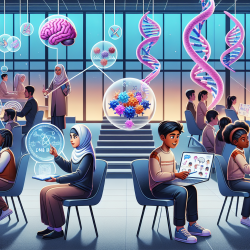The field of genetics is continually evolving, offering new insights that can significantly impact various domains, including education and therapy. A recent study titled "Multivariate analysis of 1.5 million people identifies genetic associations with traits related to self-regulation and addiction" provides groundbreaking findings that educators and therapists can leverage to enhance their practices.
Understanding the Research
This extensive study utilized data from approximately 1.5 million individuals to identify genetic loci associated with self-regulation and addiction-related traits. The research highlights over 500 genetic loci linked to behaviors such as substance use, antisocial behavior, and ADHD. These findings suggest that difficulties in self-regulation may be conceptualized as a neurodevelopmental trait with complex social and health implications.
Implications for Educators and Therapists
The insights from this research can be transformative for educators and therapists working with students who struggle with self-regulation. Here are some ways practitioners can apply these findings:
- Personalized Learning Plans: Understanding a student's genetic predispositions can help tailor educational strategies that cater to their unique needs, potentially improving engagement and outcomes.
- Early Intervention: Identifying students at risk of developing self-regulation issues early on can lead to timely interventions, reducing the likelihood of negative long-term consequences.
- Collaborative Approaches: Working with genetic counselors or researchers can provide additional insights into a student's challenges, allowing for more comprehensive support strategies.
- Professional Development: Educators should consider ongoing training to stay informed about the latest genetic research and its applications in education.
The Role of Online Therapy
TinyEYE's online therapy services can play a crucial role in addressing self-regulation challenges. By integrating genetic insights into therapy sessions, therapists can provide more targeted interventions that address the root causes of behavioral issues.
The Importance of Continued Research
This study opens the door for further exploration into the relationship between genetics and behavior. Practitioners are encouraged to stay abreast of ongoing research in this area to continually refine their approaches and ensure they are providing the most effective support possible.










